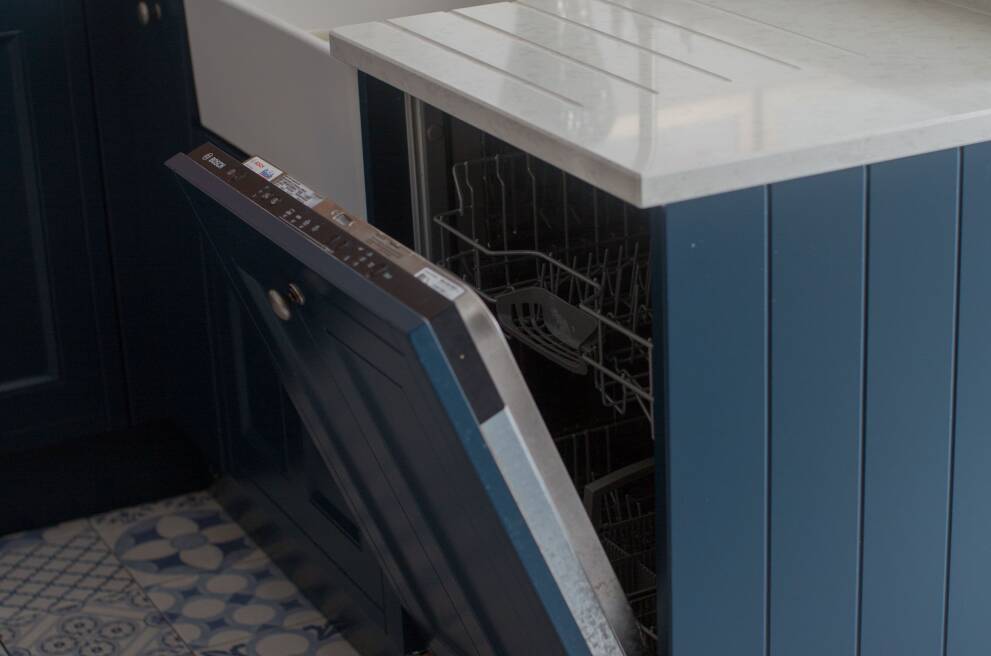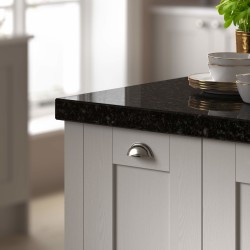Dishwashers: Buying Guide
Dishwashers
Let’s face it, no one likes washing up - that’s why dishwashers were invented. Dishwasher technology has come a long way in the last few years, becoming more efficient, powerful, and intuitive in the way they clean. Dishwashers are a must have appliance in any kitchen or home, one that you’ll use at the end of every day to handle the sometimes-messy aftermath of dinner.
Whether you’re looking to upgrade your current dishwasher, or you’re buying a dishwasher for the first time, you’ll need to consider a variety of factors such as space and budget in order to find the best dishwasher for you. That’s why we’ve created our very own dishwasher buying guide as the perfect place to start your search.

Before you start
Firstly, it’s important to be aware that not every dishwasher will meet all of your needs and requirements. It can be exciting looking at all the latest models and their fancy bonus features, but it’s worth considering which of them you’ll actually need. There’s no point in splashing out on a high-end dishwasher, only to find you’ve no use for its various drying cycles.
Doing a little planning beforehand will go a long way to making sure you’re looking at the right dishwasher types to suit your home before purchasing.
Space
Before you even start looking at all of the varied types of dishwashers, you’ll need to start by measuring the space where you want your new machine to sit. Most full-sized dishwashers measure up to 60cm wide, whereas slimline dishwashers sit on the smaller side at a more compressed 45cm. Compact dishwashers land somewhere in the middle, being slightly wider at around 55cm but much smaller. You’ll need to make sure you measure both the length and depth of your proposed space to ensure you buy a dishwasher that will fit snugly. If you don’t, you might end up with a dishwasher that juts out from under your worksurface.
Budget
The cost of a dishwasher will vary depending on the type and brand you choose. Integrated and semi-integrated dishwashers tend to carry a higher price tag than freestanding models, mainly due to the extra work required to match them with your kitchen aesthetic. And if you’re looking for advanced features, then you’ll need to be willing to pay more, so again, it’s worth considering which features you’ll actually need. On average, a good dishwasher can cost anywhere from £200 upwards while the best dishwashers might cost as much as £1,000, and that’s not including running costs.
According to the Energy Saving Trust, the average dishwasher costs between £35-£45 a year to run, with slimline dishwashers potentially costing slightly less at £25-£45 a year due to their lower power requirements. Your running costs will likely vary and it will be largely dependent on how energy efficient your chosen dishwasher is.

Types of dishwashers
There are three main types of dishwashers to choose from alongside the various different sizes. You’ll want to consider each type of dishwasher carefully against your available space and budget, as they each have their own set of benefits and drawbacks that will likely influence your decision.
Freestanding dishwashers
Freestanding dishwashers are the most common types of dishwashers and are usually on the less expensive side. The primary and best benefit of a freestanding model is that you can place it anywhere. Whether that’s in your kitchen or utility room, as long as it’s close to a plug socket and can be easily connected to a drain, you’ll have very little issue installing it. This flexibility of placement also means you can simply slide it out if you need to make repairs, and the fact it isn’t connected to your kitchen also means you can take it with you if move home!
The only real downside to buying a freestanding dishwasher is their tendency to clash with prebuilt kitchen aesthetics. If you’re looking to maintain a consistent feel with your kitchen, you may struggle to find a model that suits your look unless you hide it away with a door under the worksurfaces.

Integrated dishwashers
As the name would suggest, an integrated dishwasher is one that’s part of a built-in kitchen. Often, this means that they’re hidden by a cupboard door, allowing it to seamlessly fuse with your kitchen cabinetry and appliances. Integrated models are ideal if you want your kitchen to look streamlined and maintain a uniform ambience.
Unfortunately, integrated dishwashers come with the downside of lacking all the mobility of a freestanding model as well leaving you unable to view remaining cycle time and controls without opening the door. Needless to say, with their added installation requirements, integrated dishwashers also tend to be pricier than their freestanding counterparts.

Semi-integrated dishwashers
So, if you’re not sold on the idea of a free standing or integrated dishwasher, then a semi-integrated dishwasher might be just what you’re looking for. Combining the best of both worlds, a semi-integrated dishwasher blends seamlessly into your kitchen, either mostly hidden behind a cabinet door or by having matching cabinet panelling attached to its front. With the exception of the control panel, which is clearly on display, the rest of the dishwasher will be safely hidden away beneath your kitchen worktops.
However, semi-integrated dishwashers are by far the hardest versions to come by, and unsurprisingly, are often the most expensive option out of all dishwashers.

Slimline dishwashers
Perfect if you have a smaller kitchen and less space to work with, a slimline dishwasher is a full 15cm smaller than all of the typical full-sized dishwashers. Slimline versions are around 45cm wide and have a 90-100 item capacity, almost a quarter less than the 120-150 item capacity in most regular dishwashers, but still more than adequate for your needs.
There are, however, two drawbacks to slimline dishwashers. Their narrow shape can make them difficult to load, especially if you’ve a lot to put in. Studies have shown that some slimline dishwashers also have less-economical water usage than traditional types of dishwashers, meaning you’re potentially going to be paying a similar running cost to larger models.
Compact dishwashers
If you’re really struggling for space or find that you don’t use that many dishes and bowls, picking up a compact dishwasher is the perfect accompaniment for any cosy kitchen. Also known as a table-top dishwasher, compact dishwashers are a bit wider than slimline models at 55cm across but they’re much shorter. They can either sit atop your worksurfaces or be integrated into your cabinets to keep a streamline kitchen feel. Worksurface models also have the added benefit of being easily portable, allowing you to take it with you when you move into a larger space.
While a nifty appliance to have in a studio flat or while living on your own, a compact dishwasher’s capacity is limited to 40-60 items, meaning you can’t wash too much in one go and you might find fitting large pans in troublesome. Compact dishwashers are also the least energy and water efficient out of all types of dishwashers.
Smart dishwashers
Like with many other household appliances, including washing machines and fridge freezers, certain dishwashers can now be connected with various apps on your phone. While certainly being more expensive than standard models, smart dishwashers allow you to control their activation remotely, starting them at a specific time of the day that’s convenient for you so you can quickly empty it when you get home from work and avoid noise when you’re trying to relax after dinner. There are plenty of other features that come with them, all designed to make using your dishwasher hassle free.

Dishwasher features
Dishwasher technology is constantly improving, which means more modern and higher-end versions increasingly have exciting additional features and controls many older versions simply lack. You might not want all of these features, but it’s important to understand which features are important for your kitchen so you can look out for them when buying a dishwasher.
Automatic temperature control
Most dishwashers are now able to perfectly control the temperature of the water being used to ensure maximum efficiency and the proper activation of the cleaning agents in your detergent. Sensor washes can work out how dirty your plates are once an initial rinse has finished and then adjust the follow-up wash accordingly to use as little water as possible.
Removeable baskets
A staple of almost all types of dishwashers, and ideal if you have a slimline or compact model, practically every dishwasher comes with removable racks and baskets. These let you maximise every inch of available space so you can fit in as much as you need. Some dishwashers even have height adjustable racks that you can move up or down, depending on if you have bigger dishes you need to wash. Cutlery racks are especially handy for keeping knives and forks together but out of the way.
Child locks
Simple and effective, these locks stop a dishwasher’s door from being opened once the dishwasher has been activated, as well as stopping any changes to programmes or temperatures being made whilst it’s in use.
Energy-saving configurations
Whilst choosing the temperature on your dishwasher isn’t always on option, like it is with most washing machines, some dishwashers have their own set of energy-saving options. A particularly common setting is an Eco wash, which can be used to reduce the amount of water and electricity spent each time a dishwasher is turned on, saving you money in the long-term.
Filters
Some dishwasher models come with a self-cleaning filter, others have manual ones that you’ll need to empty by hand. Self-cleaning filters are particularly handy, operating something called a grinder. The use of a grinder can make the washing process particularly noisy but their addition has the added benefit of effortlessly breaking stubborn food up into easily removed particles.
Noise level
Some dishwashers come with a quiet mark, which means they use brushless motors when cleaning your dishes. This substantially reduces the noise they produce and are ideal if you have an open plan living space, meaning you don’t have to turn the TV up when your dishwasher is active. A decibel (dBs) rating of 50 or higher means that conversations will be audibly affected in the same room, but plenty of the higher end models have a rating of 30-45dBs, making these the preferable option if you enjoy peace and quiet.
Number of cycles
Most dishwashers will have four standard cycles: a light wash, regular wash, heavy wash, and economy wash; though many higher end models come with their own dedicated set of cycles such as a quick wash, glassware, pot scrubbing, baby items, and sanitisation.
Drying cycles
Some dishwashers even come equipped with a drying cycle, which means your dishes will come out dry once the cycle ends. This method of drying works by coating your dishes in a layer of hot water. The heat of the water contrasts with the relatively cool stainless-steel dishwasher interior to form condensation, which rapidly dries from the dishes. Not only is this energy and water efficient, but it’s also incredibly hygienic as you don’t have to wipe anything dry.
Inside a dishwasher, the tubs and racks that carry dishes, crockery and cutlery also tend to be made of a durable plastic or stainless steel. Both are constructed from long-lasting, hardwearing properties, but the advantage of stainless steel is that it better retains heat after each cycle has finished, which means your dishes dry more quickly.

Dishwasher colours and finishes
There are plenty of colours and finishes to choose from, but the most popular finish on a dishwasher is stainless steel as it’s durable and easy-to-clean. Black stainless steel is ideal if you’re looking for a subtle aesthetic, although other popular options include both white and grey. In many cases you’ll be able to find custom front panels that match the design of your kitchen.
Other minor things to consider are the location of the opening handle for easy grip and the position of the control panel. If you’re not one for bright buttons and displays, then it can be worth investing in hidden controls.
Where to buy a dishwasher
Whilst you can purchase dishwashers from a range of retailers, both in-store and online, here at Wren Kitchens we also stock a range of dishwashers, including both freestanding and integrated models in a range of colours and finishes. So, when you design your kitchen with us, you’ll get to choose your own dishwasher as part of the setup.
At Wren Kitchens, our team of expert kitchen designers have decades of experience in creating dream kitchens. We’ll walk you through every step of choosing your ideal appliances, depending on your needs and requirements. To get started, simply book an appointment at your local showroom, and get ready to create your dream kitchen! And if you want to fit your kitchen out even further but want to do more research, you can find a range of kitchen and appliance buying guides in our inspiration section.


















